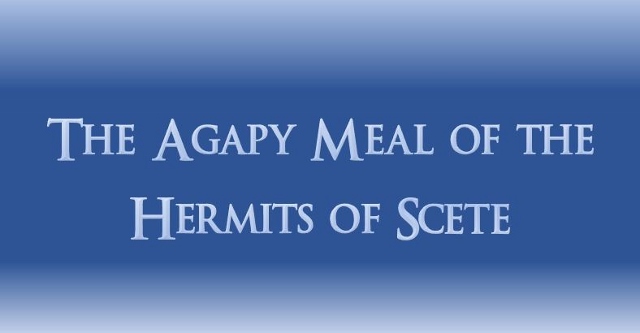A very interesting and important clue to the nature of this communal meal is furnished by the name used by the hermits themselves when referring to it: Agapy. This word was not an uncommon one in the desert hermit's vocabulary, for it had a number of meanings. It was commonly used with reference to an …
A very interesting and important clue to the nature of this communal meal is furnished by the name used by the hermits themselves when referring to it: Agapy. This word was not an uncommon one in the desert hermit’s vocabulary, for it had a number of meanings. It was commonly used with reference to an act of charity, or to something given as alms. It could also refer to a meal; and in this sense it was used to denote either a banquet taken in commemoration of the death of one of the brethren, or a meal given to the poor and needy out of charity or the meal which the hermits took together on Saturday, Sunday and the major feasts. In this last connection the term Agapy occurs quite frequently, and from its use can be inferred the solemn and religious nature of this meal.
It is reasonable to suppose that the meal began with a prayer or a blessing, for such was the normal practice even during the week when the hermits ate alone in their cells at the ninth hour. At the Agapy this function would most probably fall to the senior at each table, who would bless the food for the brethren at that table. In the monasteries, where a more cenobitical life obtained, the saying of a psalm both preceded and followed the solemn meals of Saturday, Sunday and festal times. The evening meal on these days, however, was begun and concluded with a simple prayer.
It has already been noted that the Agapy was eaten in church after the offering of the Holy Sacrifice. Just what relation this meal might have had with the Agapy of a century or two previous is not altogether clear. Whatever else may be said, it is certain that the Agapy of the hermits of Scete was not unrelated to the Sacrifice which invariably preceded it. There is one or the other text among the Apophthegmata Patrum which has bearing on this point.
“…And when the Synaxis was dismissed, he fled as if escaping from a fire and hurried to reach his cell. For the brethren often received small breads with a drink of wine after the Synaxis. He, however, refused to accept anything, not because he rejected the eulogia of the brethren, but because he wished to possess the peace of the Synaxis.”
Until the sixth century the word eulogia. retained the meaning of bread or other food blessed by the priest during the course of the Mass. It was the custom to offer breads for use in the Sacrifice of the Mass, but those which were in excess of the number needed for the Eucharist were blessed and distributed to the faithful after Mass. This text from the Apophthegmata of Abba Isaac indicates that the small breads which the hermits ate at the communal meal were the evlogia blessed during the preceding Mass.
Still another text from the Apophthegmata shows from one point of view the regard which the hermits had for the evlogia. In Abba Arsenius’ mind, excommunication from the evlogia was equivalent to excommunication from the Eucharist itself.
“The old men used to tell this story: A few dried figs were once given to Scete; and since they were not of very good quality, none of them were sent to Abba Arsenius for fear of offending him. But when the venerable man heard what had taken place, he refused to go to the Synaxis, saying: You have excommunicated me by not sharing with me the evlogia which God has sent to the brethren and which I am unworthy of receiving with you. And when all the brethren heard this they took profit from the humility of the old man. Then the presbyter leaving took him the dried figs, and brought him back with joy to the Synaxis.”
The hermits could not but have strongly reminded of the close relation between the Eucharist and the agapy when they saw sustenance for both soul and body, the Eucharist and the come thus from the Altar of God. The reverence which the hermits were expected to observe toward the sacred character of the agapy itself can be seen from the following narration:
“The Fathers used to tell how once when the brethren were eating the agapy, one of them laughed at the table. And when Abba John saw it, he wept and said: What must that brother have in his heart, seeing that he has laughed; rather he should cry since he is eating the agapy” It was also part of their discipline that a brother who lapsed into sin could not be readmitted to the agapy until he had done penance “with his whole soul”
By: Cecil Donahue
Join Us: Sign Up Today!
Tags:












